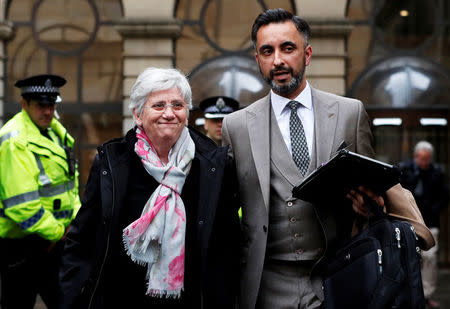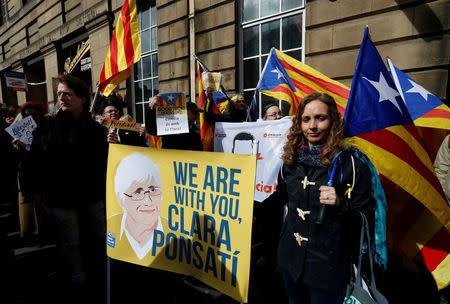Scotland should put Spanish judiciary 'on trial' in Catalan case - lawyer
By Elisabeth O'Leary
EDINBURGH (Reuters) - A Scottish court should put the Spanish legal system itself on trial as Catalan separatist Clara Ponsati battles to avoid extradition back home, her lawyer told Reuters.
Human rights lawyer Aamer Anwar said her extradition hearing, which opens next week, must ask whether the judiciary has truly freed itself from the state control exerted during the fascist dictatorship of General Francisco Franco.
Ponsati, a 61-year-old academic and former education minister in Catalonia's regional government, faces charges of rebellion over her part in organising an independence referendum last year ruled illegal under the Spanish constitution.
Prime Minister Mariano Rajoy repeated this week that Spanish judges are entirely independent, more than 40 years after Franco's death and the restoration of democracy that followed.
Anwar, who heads Ponsati's legal team, questioned this. "This case gives the possibility of putting another nation's judiciary on trial in a UK court, and holding that nation to account," he said in a telephone interview. "Is the judiciary independent or is it tied into Francoism?"
He also queried the status of a Spanish court that would try Ponsati if she is extradited under a European arrest warrant. "Has it been hand-picked by a government who says 'we have hand-picked you and this is what you are going to do'?" he said.
The Spanish government has imposed direct rule on Catalonia and is pursuing former regional government members who arranged the referendum. Nine are behind bars in Spain and while others have gone into self-imposed exile. Former secessionist leader Carles Puigdemont is under arrest in Germany, also under a European arrest warrant, but Ponsati has been freed on bail.
Ponsati has been working at Scotland's University of St Andrews and her case has resonated with Scots sympathetic to the Catalan independence cause who have raised 230,000 pounds ($324,000) towards her legal costs.
Scotland held its own independence referendum in 2014, albeit in agreement with the British government and parliament, when 55 percent of voters opted to remain in the United Kingdom.
Like Catalonia, Scotland has a high degree of autonomy from the central government. Pro-independence First Minister Nicola Sturgeon supports the right of Catalan self determination and opposes the arrests, but says she is powerless to intervene in the Scottish judicial process.
Anwar said the court would be asked to look at whether the Spanish legal system would allow Ponsati to express her views freely and whether punishments for the crimes she is charged with - rebellion against the Spanish state and misuse of public funds - are proportionate.
The case could go on to Scotland's highest court, Britain's Supreme Court and the European Court of Human Rights and is likely to take months or possibly years, he said.
Anwar described as heavy-handed baton-wielding police who burst into polling stations in October to stop people voting.
"I do think that the Spanish have not thought this through, in terms of the repercussions, in the same way as they did not think about the repercussions of sending in armed police, in the same way as a dictator thinks," said Anwar.
Madrid has defended the police actions as justified.
After Franco's death in 1975, a new constitution gave broad autonomy to regions including Catalonia and the Basque Country, whose distinct cultures had been brutally repressed under the dictator. However, it states that Spain is one nation.
While support for separatism has fallen sharply since the October vote, polls beforehand showed around 80 percent of Catalonia's 5.5 million electorate backed holding a legal referendum.
($1 = 0.7103 pounds)
(Reporting by Elisabeth O'Leary; Editing by Robin Pomeroy and David Stamp)



